HTT-lowering reverses Huntington's disease immune dysfunction caused by NFκB pathway dysregulation
- PMID: 24459107
- PMCID: PMC3983408
- DOI: 10.1093/brain/awt355
HTT-lowering reverses Huntington's disease immune dysfunction caused by NFκB pathway dysregulation
Abstract
Huntington's disease is an inherited neurodegenerative disorder caused by a CAG repeat expansion in the huntingtin gene. The peripheral innate immune system contributes to Huntington's disease pathogenesis and has been targeted successfully to modulate disease progression, but mechanistic understanding relating this to mutant huntingtin expression in immune cells has been lacking. Here we demonstrate that human Huntington's disease myeloid cells produce excessive inflammatory cytokines as a result of the cell-intrinsic effects of mutant huntingtin expression. A direct effect of mutant huntingtin on the NFκB pathway, whereby it interacts with IKKγ, leads to increased degradation of IκB and subsequent nuclear translocation of RelA. Transcriptional alterations in intracellular immune signalling pathways are also observed. Using a novel method of small interfering RNA delivery to lower huntingtin expression, we show reversal of disease-associated alterations in cellular function-the first time this has been demonstrated in primary human cells. Glucan-encapsulated small interfering RNA particles were used to lower huntingtin levels in human Huntington's disease monocytes/macrophages, resulting in a reversal of huntingtin-induced elevated cytokine production and transcriptional changes. These findings improve our understanding of the role of innate immunity in neurodegeneration, introduce glucan-encapsulated small interfering RNA particles as tool for studying cellular pathogenesis ex vivo in human cells and raise the prospect of immune cell-directed HTT-lowering as a therapeutic in Huntington's disease.
Keywords: Huntington’s disease; gene lowering; immunology; myeloid cells.
Figures
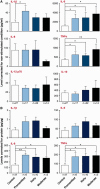
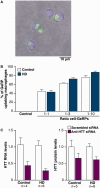
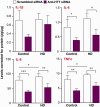
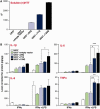
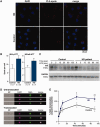


Similar articles
-
RNA-Seq of Huntington's disease patient myeloid cells reveals innate transcriptional dysregulation associated with proinflammatory pathway activation.Hum Mol Genet. 2016 Jul 15;25(14):2893-2904. doi: 10.1093/hmg/ddw142. Epub 2016 May 11. Hum Mol Genet. 2016. PMID: 27170315 Free PMC article.
-
Mutant Huntingtin Does Not Affect the Intrinsic Phenotype of Human Huntington's Disease T Lymphocytes.PLoS One. 2015 Nov 3;10(11):e0141793. doi: 10.1371/journal.pone.0141793. eCollection 2015. PLoS One. 2015. PMID: 26529236 Free PMC article.
-
Disruption of immune cell function by mutant huntingtin in Huntington's disease pathogenesis.Curr Opin Pharmacol. 2016 Feb;26:33-8. doi: 10.1016/j.coph.2015.09.008. Epub 2015 Oct 19. Curr Opin Pharmacol. 2016. PMID: 26461267 Review.
-
PRMT5- mediated symmetric arginine dimethylation is attenuated by mutant huntingtin and is impaired in Huntington's disease (HD).Cell Cycle. 2015;14(11):1716-29. doi: 10.1080/15384101.2015.1033595. Cell Cycle. 2015. PMID: 25927346 Free PMC article.
-
Huntingtin and its role in neuronal degeneration.Neuroscientist. 2004 Oct;10(5):467-75. doi: 10.1177/1073858404266777. Neuroscientist. 2004. PMID: 15359012 Review.
Cited by
-
The choreography of neuroinflammation in Huntington's disease.Trends Immunol. 2015 Jun;36(6):364-73. doi: 10.1016/j.it.2015.04.007. Epub 2015 May 20. Trends Immunol. 2015. PMID: 26001312 Free PMC article. Review.
-
The effects of huntingtin-lowering: what do we know so far?Degener Neurol Neuromuscul Dis. 2019 Mar 8;9:3-17. doi: 10.2147/DNND.S163808. eCollection 2019. Degener Neurol Neuromuscul Dis. 2019. PMID: 30881191 Free PMC article. Review.
-
JAK/STAT Signalling in Huntington's Disease Immune Cells.PLoS Curr. 2013 Dec 13;5:ecurrents.hd.5791c897b5c3bebeed93b1d1da0c0648. doi: 10.1371/currents.hd.5791c897b5c3bebeed93b1d1da0c0648. PLoS Curr. 2013. PMID: 24459609 Free PMC article.
-
The pathogenic exon 1 HTT protein is produced by incomplete splicing in Huntington's disease patients.Sci Rep. 2017 May 2;7(1):1307. doi: 10.1038/s41598-017-01510-z. Sci Rep. 2017. PMID: 28465506 Free PMC article.
-
Cyclic GMP-AMP synthase promotes the inflammatory and autophagy responses in Huntington disease.Proc Natl Acad Sci U S A. 2020 Jul 7;117(27):15989-15999. doi: 10.1073/pnas.2002144117. Epub 2020 Jun 24. Proc Natl Acad Sci U S A. 2020. PMID: 32581130 Free PMC article.
References
-
- Ajami B, Bennett JL, Krieger C, Tetzlaff W, Rossi FM. Local self-renewal can sustain CNS microglia maintenance and function throughout adult life. Nat Neurosci. 2007;10:1538–43. - PubMed
-
- Alciato F, Sainaghi PP, Sola D, Castello L, Avanzi GC. TNF-alpha, IL-6, and IL-1 expression is inhibited by GAS6 in monocytes/macrophages. J Leukoc Biol. 2010;87:869–75. - PubMed
-
- Anderson AJ, Cummings BJ, Cotman CW. Increased immunoreactivity for Jun- and Fos-related proteins in Alzheimer's disease: association with pathology. Exp Neurol. 1994;125:286–95. - PubMed
-
- Andrew SE, Goldberg YP, Kremer B, Telenius H, Theilmann J, Adam S, et al. The relationship between trinucleotide (CAG) repeat length and clinical features of Huntington's disease. Nat Genet. 1993;4:398–403. - PubMed
Publication types
MeSH terms
Substances
Grants and funding
LinkOut - more resources
Full Text Sources
Other Literature Sources
Medical

